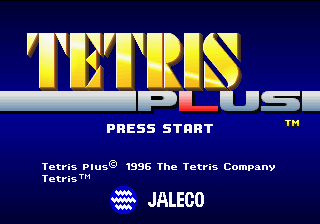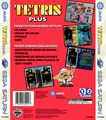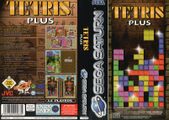Difference between revisions of "Tetris Plus"
From Sega Retro
| Line 41: | Line 41: | ||
{{ratings | {{ratings | ||
| icon=SAT | | icon=SAT | ||
| + | | mms=69 | ||
| + | | mms_source={{num|51|page=69}} | ||
| ssm=78 | | ssm=78 | ||
| ssm_source={{num|15|page=78/79}} | | ssm_source={{num|15|page=78/79}} | ||
Revision as of 15:06, 6 November 2012
This short article is in need of work. You can help Sega Retro by adding to it.
| Tetris Plus | |||||
|---|---|---|---|---|---|
| System(s): Sega Saturn | |||||
| Publisher: Jaleco (JP/US), JVC (EU) | |||||
| Developer: Jaleco Natsume | |||||
| Genre: Puzzle | |||||
| |||||
Tetris Plus (テトリスプラス) is a 1995 arcade game by Jaleco ported to multiple game systems including the Sega Saturn. Tetris Plus is notable for being the first successful release of a Tetris-brand game on a game console not developed or owned by Nintendo, succeeding in being released after Tetris for Mega Drive was blocked from release, and pre-dating the release of Tetris-S by about five months.
Gameplay
Classic Mode: Classic mode plays very much like traditional Tetris. One notable visual adjustment is a set of rainbow-colored bars besides the playing field that rise during play. Once the bars are maxed out, the speed level increases and the bars are reset. The bars rise in-sync gradually from placing Tetris pieces on the field, and gets a boost with cleared lines.
In the Sega Saturn and Sony PlayStation versions, the player always starts at level 1 on Classic Mode, with no level select available.
The ruleset is based off Sega Rotation, with a notable difference being that Tetris pieces spawn right-middle.
Puzzle Mode: Following the simple, childish plotline of "the Professor" and "his Assistant" seeking out ancient treasure, the player chooses from a set of four areas each with 20 different Puzzles. In each puzzle, the Professor is placed in a area with pre-set blocks, and a spinning spiked ceiling gradually lowering towards him. The goal in each puzzle is to guide the Professor to the bottom of the screen with an understanding of the rules of Tetris and the Professor's own behavior patterns. A Game Over happens if the Professor and the spiked ceiling collide.
After the first four areas are cleared, a final area opens up with 20 more puzzles, offering a total of 100 puzzles in Puzzle Mode.
VS. Mode: Two players compete with each other in a variation of "Puzzle Mode" rules. As players clear lines, they may send new lines to their opponent to get in the way. The first player to get his professor to the bottom of the screen wins - likewise the player wins if his opponent's professor hits the spiked ceiling.
Edit Mode: Allows players to create their own "Puzzle Mode" style puzzles. 10 pre-set Puzzles are used as examples. The puzzles can be saved to Saturn Back-up RAM.
Physical Scans
| Sega Retro Average | ||||||||||||||||||||||||||||||||||||||||||||||||||||||||||||||||||||||||||||||||||||||||||||||
|---|---|---|---|---|---|---|---|---|---|---|---|---|---|---|---|---|---|---|---|---|---|---|---|---|---|---|---|---|---|---|---|---|---|---|---|---|---|---|---|---|---|---|---|---|---|---|---|---|---|---|---|---|---|---|---|---|---|---|---|---|---|---|---|---|---|---|---|---|---|---|---|---|---|---|---|---|---|---|---|---|---|---|---|---|---|---|---|---|---|---|---|---|---|---|
|
| 67 | |
|---|---|
| Based on 18 reviews | |
| Tetris and Tetris-like games for Sega systems/developed by Sega | |
|---|---|
| Sega: Tetris (1989) | Flash Point (Mega Drive) (1989) | Bloxeed (1989) | Sega Tetris (1999) | Sega Ages 2500 Series Vol. 28: Tetris Collection (2006) | Tetris Giant (2010) | Puyo Puyo Tetris (2014) | Tetris (2019) | Puyo Puyo Tetris 2 (2020) | |
| Third-Party: Blockout (1991) | Tetris Plus (1996) | Tetris S (1996) | Tetris 4D (1998) | The Next Tetris: On-Line Edition (2000) | Tetris Kiwamemichi (2004) | Tetris The Grand Master 4: The Masters of Round (unreleased) | |
| Unlicensed: Super Columns (1990) | Super Tetris (19xx) | Flashpoint (19xx) | |
| Tetris related media | |
| Tetremix (1989) | Flash Point/Bloxeed (1990) | New Century (2006) | Puyo Puyo Tetris 1 & 2 Original Soundtrack (2020) | |
- ↑ Ação Games, "Fevereiro 1997" (BR; 1997-xx-xx), page 31
- ↑ Edge, "February 1997" (UK; 1997-01-24), page 91
- ↑ Electronic Gaming Monthly, "October 1996" (US; 1996-xx-xx), page 61
- ↑ Famitsu, "1996-09-06" (JP; 1996-08-23), page 1
- ↑ GamePro, "December 1996" (US; 1996-xx-xx), page 148
- ↑ Game Informer, "October 1996" (US; 1996-xx-xx), page 53
- ↑ Joypad, "Octobre 1996" (FR; 1996-xx-xx), page 74
- ↑ MAN!AC, "11/96" (DE; 1996-10-09), page 52
- ↑ Mean Machines Sega, "January 1997" (UK; 1996-12-06), page 69
- ↑ Next Generation, "November 1996" (US; 1996-10-22), page 274
- ↑ Saturn Fan, "1996 No. 16" (JP; 1996-07-19), page 161
- ↑ Saturn Fan, "1996 No. 21" (JP; 1996-10-04), page 62
- ↑ Saturn Power, "November 1997" (UK; 1997-09-17), page 78
- ↑ Sega Magazin, "November 1997" (DE; 1997-10-15), page 78
- ↑ Sega Power, "January 1997" (UK; 1996-12-19), page 39
- ↑ Sega Saturn Magazine, "January 1997" (UK; 1996-12-17), page 78
- ↑ Sega Saturn Magazine, "1996-16 (1996-09-27)" (JP; 1996-09-13), page 243
- ↑ Sega Saturn Magazine, "Readers rating final data" (JP; 2000-03), page 16






